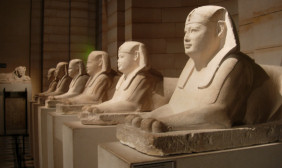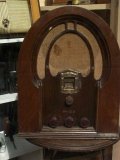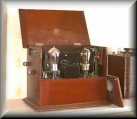Internalist Model of the senses
|
Radio drama - a sight to behold? My argument is that we experience all the five senses when we listen to a radio play, and that we can theorise about this through the internalist model. The senses 'penetrate' each other, and trigger each other when we are audiences of fiction works. We need to explain how radio audiences report experiencing all five senses though radio is a monaural (= using only the sense or mode of hearing) medium. This is the territory of consciousness studies and of reception (theory and studies). Key also is perceptual filling-in.
In the Lifeworld, our senses also operate on each other. See - as an illustration of this - McGurk effect (illusion) - hearing AND seeing talk
Beck, Alan, 2000, 'Cognitive mapping and radio drama', Consciousness and the Arts and Literature, Volume 1 Number 2, July 2000 Cognitive Mapping and Radio Drama by Alan Beck - monograph - SECTION 10 10.1-2 However, there are links across my whole perceptual array
(sight, smell, touch, hearing, taste). On what is termed the
internalist model of the human sensorium - and so back to phenomenologist
Merleau-Ponty - aural perception is in some way penetrated by
the other modes. The listener 'sees', 'tastes', 'smells', etc.,
or at least many anecdotally so report, as I said above. The
various modalities are always present or potentially so. In real-life
interaction for example, even tactility, the physical sensation
of touch, is linked to mental information of the texture of spaces,
and complex socio-cultural references (personal and universal,
intimate and distant, literal and figurative). So 'tangible'
/ 'intangible,' 'material' / 'immaterial,' 'visible' / 'invisible'
exist in parallel to each other. I could sum up this phenomenological
approach by saying that radio both is, and is not, 'invisible'.
11.2 Although the input is totally aural, my spatial cognition system, functioning well as I enjoy the play, enables me also to perceive the sound picture in all my sensory modes. So I can place the characters in their space and I can 'see' and 'smell' the sea storm, 'feel' the jungle heat and 'be in' the London Board Room. On the internalist model, which has already been referred to, aural perception is penetrated in some way by the other four modes. I switch signals: auditory to visual to olfactory etc.
See this interesting argument from Crook, Tim, Radio Drama, 1999, London: Routledge, page 7 Is it possible to get the same information through different senses - e.g. touch and vision? Radio drama benefits from being 'blind'?? A theoretical framework for evaluating radio or audio drama is largely dependent on the physical and psychological relationship between performance/ presentation and reception/perception. Is sound drama only a sound phenomenon delineated and separated from image-based narrative? I would argue that it is not. I would argue that it cannot be said that the ear cannot see. Blind people see. I realise that this is an oxymoronic statement but I would additionally argue that their brains construct an imaginative world based on image and fully separated from the eye as camera. Their experience is as rich and fulfilling as those who have the eye as camera. Profoundly deaf people can hear in their minds. The music created by deaf people has narrative, mood, emotion and aesthetics. Alan Beck comments: I have dealt with some of this in Beck, Alan, 2000, 'Cognitive mapping and radio drama', Consciousness and the Arts and Literature, Volume 1 Number 2, July 2000 There is a distinction to be made - and it is a very well-known one - between those who are blind from birth, and those who had sight and then became blind. And there is blindsight (see below). As Crook notes, it is all to do with reception by the listener, and how the listener to radio drama processes the incoming signals. Crook defends radio drama (the 'radio drama is "invisible" approach') via the externalist model of the senses. I use the internalist model of the senses. (See at the top of this page for definitions.) We rely on different strategies to achieve the same effect - which is to find a variety of ways to appreciate how radio plays are received.
wayfinding skills of blind and visually impaired people Edwards, Rachel , Ungar, Simon and Blades, Mark, 1998, 'Route Descriptions by Visually Impaired and Sighted Children from Memory and from Maps', Journal of Visual Impairment and Blindness available also as electronic publication, Department of Psychology, University of Sheffield, Sheffield S10 2TP The wayfinding skills of blind and visually impaired people
are based on very different kinds of information from those of
sighted people. The information which the visually impaired person
receives through the senses of touch, and hearing are more limited
and fragmented than visual information. Therefore both the quality
and quantity of information needed for wayfinding is likely to
differ between sighted and visually impaired people. Blindsight |
|
|







